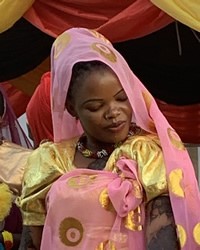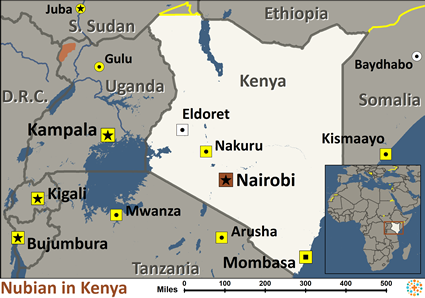The Nubi people of Uganda and Kenya originally come from southern South Sudan. In the 1800's, the area that is now modern-day Sudan and South Sudan was governed by the Ottomans as the single country of Sudan. The Ottomans formed their army from Muslims of all the different local tribes. Since the army was made up of people speaking a variety of mother tongues, they used the trade language of Arabic to communicate.
In the 1880's, a large revolt against Ottoman rule swept across Sudan. The governor of the southernmost part of Sudan became cut off from the rest of the Ottoman empire to the north. So he and his soldiers fled southward into British-ruled Uganda. The British protected them and gave the governor safe passage to the coast of East Africa, while his soldiers stayed behind. The soldiers were then incorporated into the British army and were deployed across East Africa to maintain peace. The descendants of those original soldiers came to take on a group identity and continued serving in the British army for generations. East Africans will often say disparagingly that the Nubi came as mercenaries from Sudan. But the Nubi maintain that they were legitimate soldiers in the British army and did not seek war for personal gain.
Because the Nubi originate from many tribes but were united by military service using Arabic, their language is heavily influenced by Arabic but also has features of the languages of South Sudan. It is called an Arabic-based creole. It is not certain how the name "Nubi" or "Nubian" came to be used for them, since they are unrelated to the Nubians of northern Sudan. However, before Ottoman rule, the Nubian empire covered much of what became Sudan. The East Africans in the 1800's who witnessed soldiers of Sudanese heritage coming into their lands may have associated them with the old Nubian empire renowned for its military strength. Although they are sometimes called "Nubian" in English, most East African local languages use the name "Nubi." The Nubi people are adamant that they should be called Nubi and not be confused with the Nubians who live on the Sudan-Egypt border.
The Nubi population is somewhat scattered because, unlike the other East African tribes, they have no historic homeland. They settled wherever their service in the British colonial army took them. This ended up being mostly in cities and towns where there was a barracks, rather than rural villages like the other tribes of the area. Their three largest settlements in descending order are in Bombo, Uganda; Kibera, neighborhood of Nairobi, Kenya; Arua, Uganda. The rest of the Nubi population live scattered around Uganda and western Kenya.
The Nubi tend to live less agrarian lifestyles than most East African tribes, although some do farm small plots of land near their houses and raise livestock. Many Nubi people are still employed in the military, as their ancestors have been for generations. However, many have become drivers, merchants, shopkeepers, or craftsmen.
For decades, the Nubi people have faced prejudice and discrimination from other Ugandan tribes who saw them as foreigners and mercenaries. In the 1970's, their status improved somewhat as they were favored by Idi Amin, the Muslim president of Uganda. However, when he was deposed in 1979, they were persecuted once again because they were seen as key supporters of his unpopular regime. However, in 1995 Uganda passed a new constitution that names the Nubi people as a native tribe of Uganda and makes the Nubi language a recognized language of the nation. Since then, the Nubi have been faced less discrimination.
The Nubians consist of seven non-Arab Muslim tribes that originated in the Nubia region, an area between Aswan in southern Egypt and Dongola in northern Sudan.
The Nubi are strictly and piously Muslim. In the early 1800's, their ancestors were conscripted by the Ottomans into military service by force. The Ottoman Muslims would raid into southern Sudan for slaves, forcibly converting them and indoctinating them with Islam, and then training them as soldiers. Therefore, Islam has always been a foundational part of the Nubi identity. The ancestors of modern Nubi people were Muslims before they identified as a coherent tribe or went by the name Nubi.
While East Africa is often marked by a peaceful and accepting coexistence of Muslims and Christians in the same area and tribe, Nubi are a notable exception. Usually, when a Nubi comes to Christ, they are effectively exiled from the Nubi community and then assimilated into the dominant ethnic community in that area.
The Nubi are the only remaining indigenous frontier people group of Uganda. There are few believers within the community. No Scripture has been translated into their language and there is not yet an established way to write their language. They are currently working to form a writing system for Nubi so that their children can go to school in their mother tongue. More work is needed to establish a good writing system and start mother-tongue literacy programs.
Pray for more progress in Nubi literacy work.
Pray that community leaders would become open to the possibility of Bible translation in their language.
Pray for Bible translation workers to help with this task.
Pray for mature believers in the local community to intentionally reach out to the Nubi.
Pray that God would open the hearts of the Nubi people to see who Jesus really is and be willing to follow Him, despite great social pressure.
Pray that new Nubi believers will be able to stay within their families and communities, providing an authentic witness of what it looks like to follow Jesus as a Nubi person.
Scripture Prayers for the Nubi in Kenya.
https://www.jstor.org/stable/30032239
https://theconversation.com/from-mercenaries-to-citizens-how-the-nubians-gained-acceptance-in-uganda-167725
| Profile Source: Anonymous |


























